Poul Anderson and the Northern Mythic Tradition: An Introduction
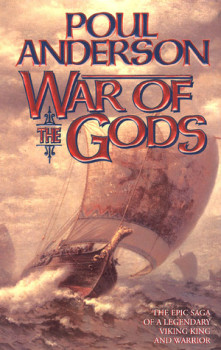 I first met Poul Anderson in the little, northern-Iowa town of Decorah, which is fitting, because Decorah has a very large Scandinavian population and takes evident pride in its Scandinavian heritage.
I first met Poul Anderson in the little, northern-Iowa town of Decorah, which is fitting, because Decorah has a very large Scandinavian population and takes evident pride in its Scandinavian heritage.
Only in a figurative sense, alas, do I say that I met Poul Anderson. Though, in the time in which I first read War of the Gods, there had been the slightest possibility that I might have met him, for Wikipedia reports that Anderson passed away on July 31, 2001, and the time in which I first became aware of his work was in 2001.
I read War of the Gods because of Dag Rossman (a professor at Luther College and a fellow fantasist likewise inspired by the Nordic mythic tradition) and a fantasy book club that he hosted. I didn’t stay with the club long, because I had to drive across the Minnesota-Iowa border from Lanesboro on back roads that were cold, desolate, and perilous during the winter months, and I had young children at the time, and sitters were always difficult to find – particularly because I was spending most of my money on publishing, with Nick Ozment, Mooreeffoc Magazine. Getting introduced to War of the Gods was the chief experience I took away from that book club – that and a copy of Tim Powers’s Expiration Date, which I always meant to return to the lender. Sorry, guy, if you happen to find me here.
War of the Gods struck me like a hammer-bolt out of the sky. How did I not know, I asked myself, that this book existed? Such is the way of many discoveries. Because, as I cast my memory back over the years, I realize that I should have known. I remembered a too-tall-for-his-age, very blonde, and (to my eyes, at least) somewhat ungainly kid whom I often had regarded with curiosity from afar. This was because I had noted, as so many in our tribe are astute at noting – particularly in those days when geek culture had not yet gone mainstream – that this guy read comic books and fantasy novels and science fiction novels. But I realized that I had no means with which to start a conversation with him, because he wasn’t reading what I was reading. Moreover, this kid’s first name was Poul. Perhaps because of his unusual name, perhaps because of his size, this kid, when I spied him from afar, was always solitary, and perhaps he preferred it that way. But he certainly seemed reasonable and social enough when I finally spoke to him, having come across him in the wilds of Eden Prairie (the parking lot of Lund’s grocery store may very well be “wild,” in the suburbs). Poul told me that Poul Anderson’s novels were awesome, that I should read them, that they were about Vikings and Norse mythology. He also said that I should be reading Walter Simonson’s Thor comics for Marvel, incidentally.
And then I never spoke to him again. And, unfortunately, I never took his recommendations.
Until much later, of course. Now, obviously, both of these oversights have been remedied.
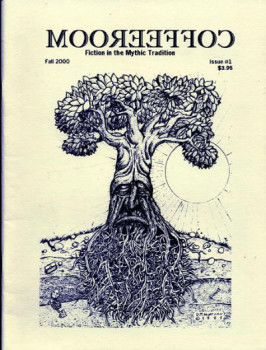 War of the Gods was not my first introduction to Norse mythology, not by any means. I consider myself to be a fourth generation Norwegian immigrant (my great-grandfather emigrated to the United States). I am predominately Norwegian on both sides of my family. We eat lutefisk and lefse and krumkake at any holiday gathering. My father speaks Norwegian (having studied it at Luther College and then, later, at the University of Minnesota – the same school from which Anderson earned his degree in physics; the understanding of the Norwegian language, unfortunately, ended with me). Moreover, anyone who has been following my posts will know that I discovered Tolkien at a fairly early age. Read Tom Shippey, if you want to know just how deeply indebted to the northern tradition is Tolkien, from the names of his dwarves (and Gandalf himself, for that matter) to the culture of the Rohirrim to even, I would argue, Turin’s confrontation with the dragon Glaurung in The Silmarillion and in The Children of Hurin. Much of my understanding of Norse mythology might have been easily intuited from these works, something that I shall have occasion on which to elaborate later. But I also had been given children’s books like Trolls and their Relatives, and even proper troll figures from Norway (not the punky-haired toys that now come with plastic gems in their bellies), and anyone in my family knew that I liked all things fay (and fey), particularly of the northern variety. By the time I first encountered War of the Gods, I had read a number of books on Norse mythology and considered myself something of an expert.
War of the Gods was not my first introduction to Norse mythology, not by any means. I consider myself to be a fourth generation Norwegian immigrant (my great-grandfather emigrated to the United States). I am predominately Norwegian on both sides of my family. We eat lutefisk and lefse and krumkake at any holiday gathering. My father speaks Norwegian (having studied it at Luther College and then, later, at the University of Minnesota – the same school from which Anderson earned his degree in physics; the understanding of the Norwegian language, unfortunately, ended with me). Moreover, anyone who has been following my posts will know that I discovered Tolkien at a fairly early age. Read Tom Shippey, if you want to know just how deeply indebted to the northern tradition is Tolkien, from the names of his dwarves (and Gandalf himself, for that matter) to the culture of the Rohirrim to even, I would argue, Turin’s confrontation with the dragon Glaurung in The Silmarillion and in The Children of Hurin. Much of my understanding of Norse mythology might have been easily intuited from these works, something that I shall have occasion on which to elaborate later. But I also had been given children’s books like Trolls and their Relatives, and even proper troll figures from Norway (not the punky-haired toys that now come with plastic gems in their bellies), and anyone in my family knew that I liked all things fay (and fey), particularly of the northern variety. By the time I first encountered War of the Gods, I had read a number of books on Norse mythology and considered myself something of an expert.
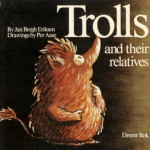 There is yet another reason why I might have felt so intimately familiar with the northern material – even, perhaps, before I began to encounter it in literature. It quite literally might have been, and it might remain, in my genes.
There is yet another reason why I might have felt so intimately familiar with the northern material – even, perhaps, before I began to encounter it in literature. It quite literally might have been, and it might remain, in my genes.
Now, when I say it’s in my genes, I’m of course referring to an actual physicality, but what I’m actually talking about might be quite a bit spookier than that. Perhaps I’m talking about ancestral memory. Perhaps I’m referring to what Carl Jung was exploring with his theories of the collective unconscious, or what Joseph Campbell has considered, through his analysis of mythic and literary works, to be universal psychological structures. But I’m talking about something more personal than this. I’m suggesting that I might have, deep in my unconscious, a memory of a pre-modern, Nordic worldview.
 Many – particularly fantasists – have written about longing – longing for another world, longing for another mode of being, longing for a pre-industrial society (without all of the problems that pragmatists love to remind us are attendant on a lack of industrialism, of course, problems like not having any leisure time because you’re scratching out an existence on a bit of land, problems resulting from having to grow and preserve your own food, spin your own wool, and build your own shelter, all possibly while dying from the latest plague because you don’t have antibiotics). A German word for this kind of longing is sehnsucht, which has the additional meaning of “intensely missing.” C.S. Lewis, in Mere Christianity, suggests that this feeling might be viewed as evidence for God (or the Tau, as he refers to the concept in that work). If we are longing and “missing” something, he argues, for what must we be longing? In other words, he argues that there can’t be such a thing as longing if there exists no such referent for it. Also attached to this longing, Lewis argues, is the unshakeable feeling that the world is not the way it is supposed to be, which becomes another self-evident argument for theism, according to Lewis, because, if we exist only in our natural, spiritual environment, then why do we feel uncomfortable? He likens this to a fish that obviously doesn’t feel “wet” because it’s the material through which it swims. But humanity feels “wet” because humanity actually longs for a return, a reunification with God in the Garden of Eden (and in Eden we now have got rid of the poor quality of life absent industrialism).
Many – particularly fantasists – have written about longing – longing for another world, longing for another mode of being, longing for a pre-industrial society (without all of the problems that pragmatists love to remind us are attendant on a lack of industrialism, of course, problems like not having any leisure time because you’re scratching out an existence on a bit of land, problems resulting from having to grow and preserve your own food, spin your own wool, and build your own shelter, all possibly while dying from the latest plague because you don’t have antibiotics). A German word for this kind of longing is sehnsucht, which has the additional meaning of “intensely missing.” C.S. Lewis, in Mere Christianity, suggests that this feeling might be viewed as evidence for God (or the Tau, as he refers to the concept in that work). If we are longing and “missing” something, he argues, for what must we be longing? In other words, he argues that there can’t be such a thing as longing if there exists no such referent for it. Also attached to this longing, Lewis argues, is the unshakeable feeling that the world is not the way it is supposed to be, which becomes another self-evident argument for theism, according to Lewis, because, if we exist only in our natural, spiritual environment, then why do we feel uncomfortable? He likens this to a fish that obviously doesn’t feel “wet” because it’s the material through which it swims. But humanity feels “wet” because humanity actually longs for a return, a reunification with God in the Garden of Eden (and in Eden we now have got rid of the poor quality of life absent industrialism).
Now, religion is one of my favorite subjects, but I will curtail this discussion now, because I want to apply this chain of thought only to considerations for why, as I came of age in the Minneapolis suburbs, I felt such sadness. I did not like the world. I did not feel comfortable among the too-green lawns and the blacktopped streets and the fast food franchises. I wanted to escape, and my only means of escape was through my reading. The only time my soul was soothed was when I retreated into a work of fantasy literature. I am applying Lewis’s argument to the desire for fantasy worlds rather than to the yearning for the Tau (though Lewis probably wouldn’t have considered there to be much difference between the numinous in fantasy and the Tau in the Garden).
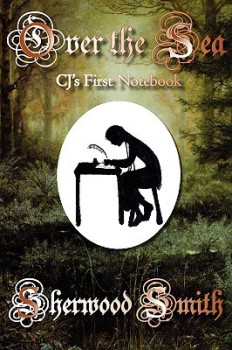 One of my favorite writers says this better than I. In Over the Sea: CJ’s First Notebook, Sherwood Smith details the young life and views of a protagonist to whom I expect many genre lovers will relate.
One of my favorite writers says this better than I. In Over the Sea: CJ’s First Notebook, Sherwood Smith details the young life and views of a protagonist to whom I expect many genre lovers will relate.
This “first notebook” is the record of an earth girl who ended up in another world and ultimately lived there (incidentally, this is why Jack Zipes , who has written many scholarly works on “fairy tales,” considers L. Frank Baum’s Oz books to be subversive in nature, because, through Dorothy’s final decision to remain in Oz wherein life, presumably, is much better than life in the “real” world, Baum’s books criticize capitalist, industrialist society). CJ tries to explain, for an otherworldly audience, what her previous world and life was like. She writes, “Now, Earth is a big world, full of people, many of whom are happy and content and would never spend one moment thinking about other worlds, much less wanting to go to one.” CJ believes that, in her previous world, her values didn’t correspond to those of other people. Moreover, in that world, she frequently underwent ridicule for her strange interests. To escape, she writes, “I read a lot to find places in the imagination that weren’t like where I lived, since I couldn’t get free any other way. But almost every book I read, every adult I listened to – well, even kids – worked hard to convince me that ‘belonging’ was my duty, and I ought to work hard to fit myself into the world into which I’d been born.” But what was so different about the nature of the world into which CJ had been born? She explains,
[T]he part of Earth I lived on, and the time I was born into, was – to me – determinedly ugly. I can’t even translate some of the words that were part of everyday life – like cigarettes, and plastic, and smog. The houses were ugly, the clothes were ugly, the smells were ugly, but mostly (to me) the spirit was ugly. Most of the ugliness was perpetrated in the name of Progress, and was not ugly to the perpetrators. To them, cutting down all the trees and covering the ground with cement was Progress. To complain meant you were not conforming to the standards of Progress.
Consciously or not, this passage echoes many of the same concerns and criticisms that Tolkien held about progress and industrialism. What Smith has done with this passage and CJ’s subsequent adventures is to make a literalized commentary and defense of the virtues of escapist fantasy literature, a defense that Tolkien makes overt in his oft-cited “On Fairy-Stories”.
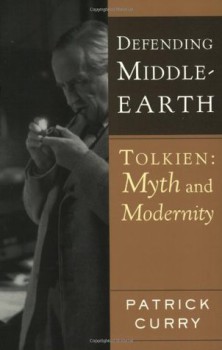 One of fantasy’s virtues, Tolkien says, is the agency of escape, and Patrick Curry, in Defending Middle Earth, argues that much of this escape is an escape into something that actually has been lost. Curry says that his experience of first reading Tolkien felt like a return to a mode of being that he had somehow forgotten, that this apprehension was “not so much like a discovery as a re-discovery, a reconnection with a living tradition that [he] hadn’t been aware of.” He even argues, in a mythic, poetic, and psychological sense, that Middle-Earth is real. He says,
One of fantasy’s virtues, Tolkien says, is the agency of escape, and Patrick Curry, in Defending Middle Earth, argues that much of this escape is an escape into something that actually has been lost. Curry says that his experience of first reading Tolkien felt like a return to a mode of being that he had somehow forgotten, that this apprehension was “not so much like a discovery as a re-discovery, a reconnection with a living tradition that [he] hadn’t been aware of.” He even argues, in a mythic, poetic, and psychological sense, that Middle-Earth is real. He says,
The reality of Middle-earth … is not so strange. Mythologies, like other kinds of cultural traditions, contain, in coded form, a great deal of feeling and emotion in the form of accumulated human experience: the collective memories, hopes, wishes, fears and dreams of entire communities across time. … Tolkien’s books present a highly distilled and concentrated, if unavoidably selective, instance of just that. It may also be that in a world saturated with Graeco-Judaic traditions, it has come as a relief to many to be offered access to broadly neglected Northern ones – particularly if they still somehow feel like “ours,” or even “us.”
It was considerations similar to these that I took up when, for my graduate thesis, I focused my attention on Ole Edvart Rolvaag’s Immigrant Trilogy, the most well known of which is his first volume, Giants in the Earth. My angle was one that is highly informed by studies in magic realism, studies that suggest that expressions of magic realism grow out of areas in which a pre-Modern, indigenous culture is colonized and marginalized by the dominant, Modern, post-Enlightenment culture of scientific empiricism. The loss of these mythic structures, dissipated through the imposition of Western rationalism, results in a form of collective, psychological trauma. I was arrested at how the American Great Plains were described through Rolvaag’s immigrant lens as a landscape in which cattle might vanish because trolls had yanked them into the earth. Rolvaag’s Great Plains was a landscape beneath a sky personified as an actual witch intent on driving the settlers away. Rolvaag himself came from the small fishing community of Donna, in northern Norway, a place in which a ghost inhabited the woodshed and his grandparents had actually seen a sea serpent. We – even we lovers of fantasy – may smirk and shake our heads condescendingly. But this was reality for Rolvaag and for his people, a reality similar to the one Curry points to as Tolkien’s world. And the loss of this world – the education out of this world – is a re-education out of one fundamental aspect of tribal identity. Could it be possible that, even as a fully assimilated fourth-generation Norwegian immigrant, part of my suburban sadness was a result of that missing identity, that lobotomizing of a northern, communal, mythic structure?
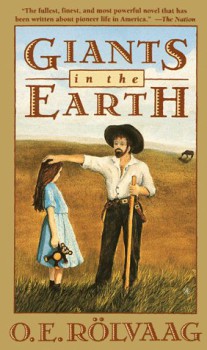 Did I, despite all, somehow remember a worldview that I, empirically, had never known? If so, how? Was it ancestral memory? Was it something more theosophical, akin to the transmigration of the soul? I believe that Robert E. Howard, probably impelled by some of the same desires that I have highlighted here, entertained this idea, both in his poem “Cimmeria”, which begins, consciously enough, with I remember, and in his twisted fantasy “People of the Dark”, in which a jealous lover, intent on revenge, hits his head in “Dagon’s Cave” and suddenly remembers being “Conan the reaver” in a previous life.
Did I, despite all, somehow remember a worldview that I, empirically, had never known? If so, how? Was it ancestral memory? Was it something more theosophical, akin to the transmigration of the soul? I believe that Robert E. Howard, probably impelled by some of the same desires that I have highlighted here, entertained this idea, both in his poem “Cimmeria”, which begins, consciously enough, with I remember, and in his twisted fantasy “People of the Dark”, in which a jealous lover, intent on revenge, hits his head in “Dagon’s Cave” and suddenly remembers being “Conan the reaver” in a previous life.
My final observation on this subject shall be overly personal. I have explained elsewhere that, in youth, I was an avid roleplayer, at first chiefly of Middle-Earth Roleplaying, and one of the campaign modules I owned was the Lost Realm of Cardolan. The cover featured the image of a bronze-plated warrior facing a rampaging hill-troll, which was cool enough, but this was not the reason why I simply stared at this illustration for many minutes daily. What attracted me was the landscape, the stones. It seemed that I almost could touch the rock, stroke those boulders, press against their weight. I almost felt the cool, near-ocean breeze on my face. Above all, I felt like I knew that landscape. I remembered it somehow, though I knew that I had never seen anything quite like it.
What an odd sensation, then, when, about twenty years later, my father gifted me with a trip to Norway. We stayed with family in the coastal city of Egersund and later drove a car up the perilous, narrow mountain roads to the family farm of Dybing. It was up here, on this mountain slope, that I found my landscape, my stones. Could it have been that I remembered that Norwegian family farm, even as a fourth generation immigrant fully assimilated into American culture? Could it be that Angus McBride’s painting set off those memories, those feelings, that sense of nostalgia and déjà vu so many years ago?
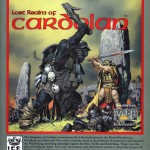 (Full disclosure: looking at the image now, it is not the landscape I remember in Dybing. What I had “remembered” about that painting was somehow more like the mountainside farm than McBride’s actual brushstrokes.)
(Full disclosure: looking at the image now, it is not the landscape I remember in Dybing. What I had “remembered” about that painting was somehow more like the mountainside farm than McBride’s actual brushstrokes.)
This is my introduction to my forthcoming survey of Anderson’s fantasy work. When I read War of the Gods so many years ago, I realized that Anderson’s was a kindred soul working within a shared mythic – perhaps even genetic – tradition. When John O’Neill asked how I might contradistinguish my contributions to this magazine from others’, I proposed this series and suggested that I publish on Wednesdays – Odin’s Day, fitting enough. Apparently this was my wyrd, for O’Neill said that this was precisely the day in which he needed me.
Till next Odin’s Day, then! Skol!
Anderson was a noted Sherlock Holmes and Solar Pons devotee as well.
A fine reminder that I need to read a lot more Poul Anderson.
I’ve been making my way through THE HUGO WINNERS, Volume 2, recently, and I read his very fine novella, “No Truce With Kings,” about the battles inside a post-collapse US. It reminded me what a stellar plotter he was.
NESFA Press has been slowly publishing his short fiction in a number of gorgeous volumes (Call Me Joe, The Queen of Air and Darkness, The Saturn Game, Admiralty, Door to Anywhere and A Bicycle Built for Brew, so far), and I’ve been steadily collecting them. As usual, I tend to gravitate to the short fiction first. 🙂
I’ve been thinking of picking up The Broken Sword (I think the only Poul Anderson I’ve read is his Conan pastiche). But I briefly scanned the sample on Amazon, and the prose seemed a little hard to follow, Does it get easier?
Also for someone new to Anderson, would you recommend reading The Broken Sword first or War of Gods?
Bob, I’ve come across that in my reading. Have you written about this yet? I would love to learn more.
John, as you know, the spirit of this survey is to focus on Anderson’s fantasy works, but I have been collecting (and reading) his science fiction work, as well. And as many essays and errata as I can find. There should be some interesting side trips.
Kid_greg, your question is thornier than one might expect. I thought about it long and hard, and I’m going to presume that you might enjoy _War of the Gods_ much more than _The Broken Sword_. _War of the Gods_ is a result of a much older, much more accomplished Anderson. I think you will enjoy the bolder, more economical writing style. As a further observation, a version of _The Broken Sword_ was published in 1954, revised and republished in 1971, and, according to Sandra Miesel, much of the revision entailed trimming Anderson’s overly ornate 1954 prose style. There is also this to say: the content of _The Broken Sword_ draws heavily on Viking age tropes, but it really is a kind of original fantasy, with the figures and concepts of Viking age stuff transformed by Anderson’s imagination. In contrast, _War of the Gods_ is through and through Viking age epic, a formulation of actual saga sources, a form that I believe he first developed with his 1973 _Hrolf Kraki’s Saga_, which I also recommend.
Thanks so much Gabe
Gabe, I became so enamored of that children’s book Trolls and Their Relatives back in the days when I lived with you and your family that I eventually sought out my own copy, which holds a place of honor on my shelves. That book also introduced me to the Scandinavian folklore of the Hulder, which I worked into two stories of my own.
Most of my impressions of Norse myths are based on the D’Aulaire book (originally titled Norse Gods & Giants, I believe) that I read obsessively back in my younger days.
I’ve read Broken Sword and Hrolf Kraki’s Saga; I really should read War of the Gods one of these days.